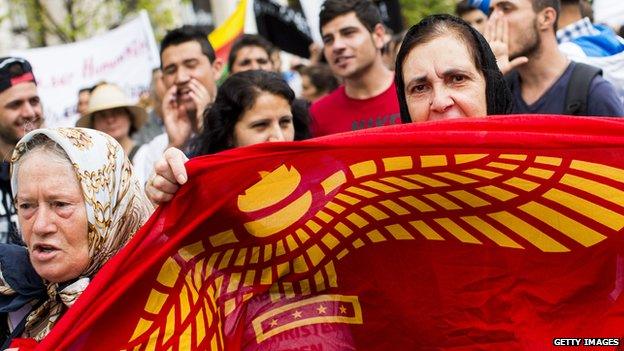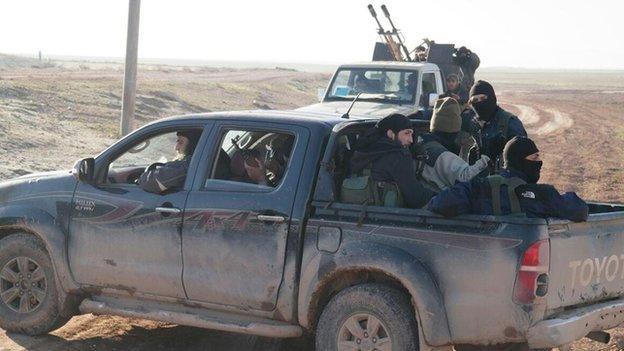Islamic State's position on Christians
- Published

Peoples of other faiths have reason to fear Islamic State
The recent abduction of dozens of Assyrian Christians and the mass beheading of Egyptian Copts at the hands of the Islamic State (IS) militant group raises questions about its stance on Christians, both in the Middle East and worldwide.
While there is a general consensus among Islamic scholars that both Christians and Jews enjoy special status under an Islamic state which guarantees them safety in exchange for paying a special tax and other conditions, IS has recently signalled that this status would be an exception rather than the rule.
When the group announced the beheading of the Copts earlier this month, it said it had acted in revenge for the alleged mistreatment of Coptic women converts to Islam by the Egyptian Coptic Church.
But it also indicated that they had been targeted because they were part of the "nation of the Cross" - an apparent reference to Christians worldwide - which was waging a "Crusader" war against Islam.
This appeared to suggest that all Christians, regardless of their sectarian affiliations, were legitimate targets for IS.
Nevertheless, there is also evidence that the group is willing to tolerate Christian minorities in areas under its control.
'Protected status'
The news was reminiscent of the abduction of the Egyptian Copts in Libya who were subsequently beheaded by IS militants there.
The fact that IS has taken the Assyrians prisoner would suggest they are not accorded protected status.

IS fighters have captured Assyrian Christian villages in Syria
It has already signalled its hostility towards the Assyrian Christian prisoners by describing them as "Crusaders".
Unlike other religious minorities - such as the Yazidis - Christians and Jews are generally considered to have protected ("Dhimmi") status because they belong to monotheistic religions like Islam.
But IS appears to view Christians primarily as enemies that must be fought and subdued.
Contrary to the prevailing view in Muslim countries, IS regards Christians as being afforded the protected status of Dhimmis only if they pay a special tax called jizya and fulfil other stringent obligations. Those obligations are subject to IS's own interpretation.
When Islamic State in Iraq (ISI), as it was known at the time, targeted a Catholic church in Baghdad in 2010 it linked the attack with the alleged persecution of Muslim women converts by the Coptic Church in Egypt.
ISI held Iraq's Christians responsible for the Coptic Church's actions by failing to denounce its alleged crimes committed against Muslims.
Shortly afterwards, ISI issued a statement announcing that Iraq's Christians were legitimate targets. A wave of attacks followed in areas with a Christian majority in Iraq.
Nevertheless, Christians have not always been seen as enemies by the group.
A few years earlier, Christian minorities in areas of Iraq that had been under ISI control did enjoy the group's protection. A statement issued by the group's Mosul branch in 2008 referred to a pact concluded with Christian community leaders and ISI.
More recently, in 2014, IS offered similar protection to Christians in its stronghold of Raqqa in Syria and possibly in other areas under the group's control in both Syria and Iraq.
IS gave Christians three options: to convert to Islam; to remain Christian but pay taxes and conform to strict Islamic rules; or to reject the first two options and face war from the group.
But in the latest edition of its English-language magazine Dabiq, the group listed Christians among IS's main enemies.
It said IS advocated jihad against "the Jews, the Christians, the Rafida [Shia] and the proponents of democracy".
BBC Monitoring, external reports and analyses news from TV, radio, web and print media around the world. You can follow BBC Monitoring on Twitter , externaland Facebook, external.